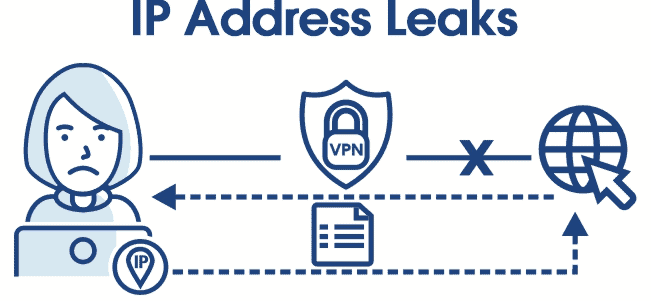When you browse the internet, your IP address is one of the most important pieces of information about you. It can reveal your location, habits, and even expose you to hackers or unwanted tracking. But sometimes, even when you're trying to protect your privacy, your IP can leak out without you knowing. This is called an IP Leak.
In 2025, as online security becomes even more crucial, preventing IP Leaks is essential to keeping your personal information safe. Whether you're using a VPN, accessing public Wi-Fi, or just browsing a website, an IP Leak could expose your data to risks you might not even be aware of. The truth is, even the best security tools aren't always foolproof. In this guide, we’ll walk through what an IP Leak is, how it happens, and, most importantly, how to stop it from happening to you. Let’s dive in and protect your online privacy together.
What is an IP Leak?
An IP Leak occurs when your real IP address is exposed to websites, apps, or third parties, despite using privacy tools like VPNs. This can happen without your knowledge, risking your online privacy and security. Typically, when browsing the web, your device uses an IP address to connect to websites. However, if an IP Leak happens, this address can be accessed by those websites, revealing your location and internet service provider.
Several factors contribute to IP Leaks. For instance, using insecure networks, like public Wi-Fi, increases the chance of exposure. Additionally, if your VPN is misconfigured or fails to encrypt your traffic properly, your real IP address may still be visible. Even your browser’s settings, like WebRTC or DNS configurations, can leave you vulnerable to IP Leaks. Thus, understanding and preventing IP Leaks is crucial to maintaining online security and privacy.
Common Causes of IP Leaks
There are several common reasons why an IP Leak can occur. Understanding these causes is essential to protecting your privacy online.
- VPN Failures: VPNs are designed to mask your IP address. However, sometimes they fail. If a VPN disconnects unexpectedly or has weak encryption, your real IP address can be exposed. This is one of the most frequent causes of IP Leaks, especially when the VPN provider doesn’t have built-in leak protection.
- WebRTC Leaks: WebRTC is a protocol used for real-time communication, like video chats. However, it can leak your IP Leak even if you are using a VPN. This happens because WebRTC bypasses VPN protections and reveals your true IP address to websites. It’s a common cause of IP Leaks on browsers like Chrome and Firefox.
- DNS Leaks: DNS (Domain Name System) is responsible for converting website addresses into IP addresses. If your DNS requests are not properly routed through your VPN, they may reveal your real IP Leak. This can happen if you’re using unreliable or improperly configured DNS servers, making you vulnerable to IP Leaks.
- Browser Misconfigurations: Sometimes, default settings in browsers or weak security protocols can leave you exposed to IP Leaks. Browsers may send traffic outside of the VPN tunnel if certain security features are disabled or misconfigured. This is why reviewing your browser settings is important to prevent IP Leaks.
Each of these causes highlights the importance of having reliable security measures in place. By understanding these causes, you can take the necessary steps to prevent IP Leaks and protect your online privacy.

Why IP Leaks Are Dangerous
When your IP Leak happens, it can expose more than just your internet connection. There are serious risks to your privacy and security.
- Privacy Risks: A IP Leak can reveal your location and browsing habits. Websites and services can track where you are and what you’re looking at. This means your personal information could be accessed without your consent. Your IP Leak becomes a gateway for others to learn more about you than you'd like, which is why it’s important to prevent it.
- Security Vulnerabilities: When your IP Leak is exposed, hackers or malicious users can use that information against you. They could target your device, steal sensitive data, or even launch attacks like DDoS (Distributed Denial of Service) attacks. An IP Leak makes it easier for them to pinpoint your device and vulnerabilities, putting your online security at risk.
- Tracking and Profiling: Advertisers and trackers often use your IP Leak to gather personal data. They track your online activities and create profiles based on what you do. This can lead to unwanted ads or even worse, data selling. When your IP Leak is exposed, you lose control over your digital identity, and third parties gain access to your online habits.
With these risks, it’s clear that IP Leaks pose a serious threat to both your privacy and security. Understanding and preventing these leaks is essential for safe online activity.
How to Detect IP Leaks
Detecting an IP Leak is crucial to maintaining your online privacy and security. Here are some simple ways to check if your IP Leak is occurring.
- IP Leak Testing Tools: Many websites offer free IP Leak testing tools. These tools allow you to quickly check if your real IP address is exposed. Simply visit a website like "WhatIsMyIP.com" or "IPLeak.net" to see whether your IP Leak is happening. If your real IP address shows up, it's time to fix the issue.
- Testing VPN Connections: One of the best ways to prevent an IP Leak is by using a VPN. To check if your VPN is working properly, use online tools to test your IP Leak. If your VPN is set up correctly, your IP address should show the VPN server’s IP, not your real one. If the tool detects your real IP, then your VPN is leaking.
- Browser Settings Check: Your browser may be causing IP Leaks if it’s misconfigured. To avoid this, check your browser’s settings and ensure that features like WebRTC are disabled, as this can reveal your real IP. Additionally, disable location sharing and use private browsing to further prevent IP Leaks. Regularly reviewing and configuring your browser settings will help secure your IP.
By using these methods, you can easily detect an IP Leak and take action to prevent it. Regular checks will ensure that your personal data remains secure.
Best Practices to Prevent IP Leaks
Preventing IP Leaks is essential to ensure your online privacy and security. Here are some important practices to help you avoid IP Leaks.
- Use Reliable VPN Services: A trustworthy VPN is one of the best ways to protect your IP Leak. Make sure to choose a VPN that offers built-in leak protection. A quality VPN will mask your IP Leak by routing your traffic through secure servers, ensuring that your real IP address remains hidden. Some VPNs even offer additional protections like kill switches to stop internet access if the VPN disconnects.
- Enable DNS and WebRTC Leak Protection: Both DNS and WebRTC leaks can expose your real IP Leak even when you’re using a VPN. Always ensure your VPN or browser is configured to prevent these leaks. Enabling DNS leak protection can stop DNS queries from revealing your IP Leak. Similarly, disabling WebRTC in your browser settings prevents it from bypassing your VPN and leaking your real IP address.
- Avoid Public Wi-Fi: Public Wi-Fi networks, such as those in cafes or airports, can be insecure and expose you to IP Leaks. Hackers can easily intercept your connection on these networks, putting your data at risk. If you must use public Wi-Fi, always connect to a VPN first to protect your IP Leak and personal information.
- Use HTTPS Everywhere: Websites with HTTPS encrypt your connection, making it harder for anyone to intercept your data. This also helps reduce the chances of IP Leaks. Always look for the padlock icon in your browser before entering sensitive information, and consider using browser extensions like HTTPS Everywhere to ensure secure connections on all websites you visit.
By following these best practices, you can minimize the risk of IP Leaks and maintain a secure and private online experience. These measures will help safeguard your IP Leak and ensure your browsing stays private.

DICloak: A Powerful Solution to Prevent IP Leaks
While standard solutions like VPNs and browser configurations can help prevent IP Leaks, DICloak offers a far more advanced and secure approach. Here’s how DICloak ensures your IP Leak is blocked effectively:
- Isolated Browsing Sessions:
DICloak creates a unique environment for every browsing session, ensuring no overlap between sessions. This prevents IP Leaks by keeping your browsing activity separate. Since each session operates independently, your real IP Leak remains undetected by websites and third-party trackers. - Cookie Separation and Enhanced Privacy:
DICloak uses cookie separation to isolate your cookies within each session. This prevents external parties from linking your activity across websites, significantly reducing the risk of IP Leaks. In addition, with no data overlap between sessions, your personal information is much less likely to be exposed. Your online activity stays private and secure, free from any tracking that could lead to an IP Leak. - Proxy Resources for Enhanced IP Leak Protection: A key feature of DICloak is its access to a variety of third-party proxy resources. These proxies can be easily configured, providing an extra layer of protection for your IP Leak. By using these proxies, you can ensure your real IP Leak remains hidden, making it almost impossible for websites or external parties to detect your true location or identity. This makes DICloak a powerful tool to protect your online privacy and securely manage multiple accounts.
- Proxy Resources for Extra Security:
Although DICloak does not provide proxies directly, it offers a range of third-party proxy resources that can further enhance your IP Leak protection. By combining DICloak’s isolated browsing environment with trusted proxy services, you can add an extra layer of security to prevent your IP Leak. These proxies help mask your IP address, making your online activities even more secure and undetectable.
In conclusion, DICloak offers a multi-layered, advanced solution to prevent IP Leaks, combining isolated sessions, cookie separation, and proxy resources to ensure maximum privacy and security. By using DICloak, you effectively safeguard your IP Leak and ensure your personal information remains protected during all online activities.
FAQs
- What is an IP Leak?
An IP Leak occurs when your real IP address is exposed while browsing, risking your privacy and security. DICloak prevents this by isolating each browsing session. - How does DICloak prevent IP Leaks?
DICloak isolates each browsing session, ensuring no overlap of data or cookies. This prevents IP Leaks, ensuring your true IP address remains hidden and your privacy is maintained. - Can DICloak hide my real IP address?
Yes, DICloak hides your real IP Leak by creating a separate environment for each session, preventing exposure of your true IP address during online activities. - Do I need a proxy with DICloak?
While DICloak doesn’t provide proxies directly, it offers third-party proxy resources to further enhance IP Leak protection, ensuring complete security during browsing.
Conclusion
Preventing IP Leaks is crucial for safeguarding your privacy and security online. By using DICloak, you ensure that your real IP Leak remains hidden through isolated sessions and cookie separation. With the additional benefit of proxy resources, DICloak provides a comprehensive, multi-layered solution to protect your online identity and data.